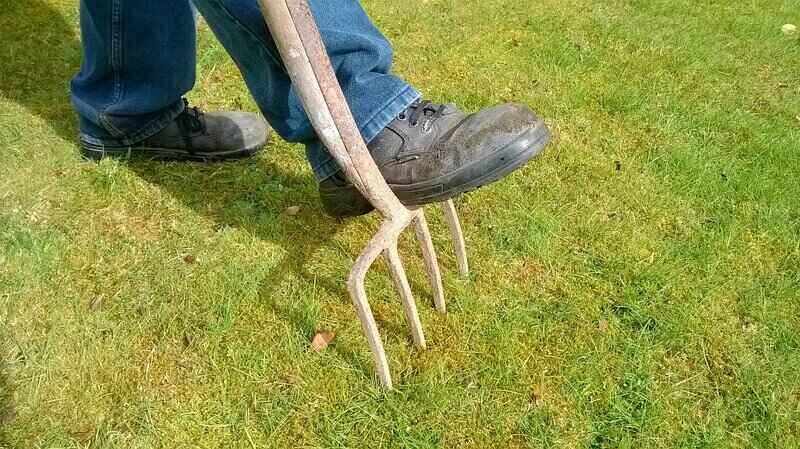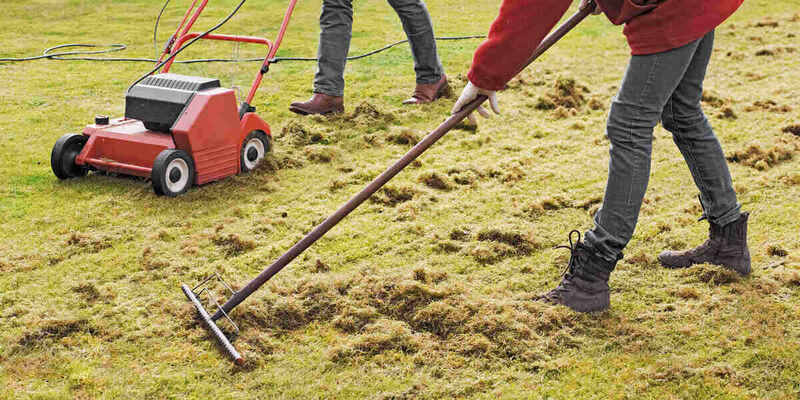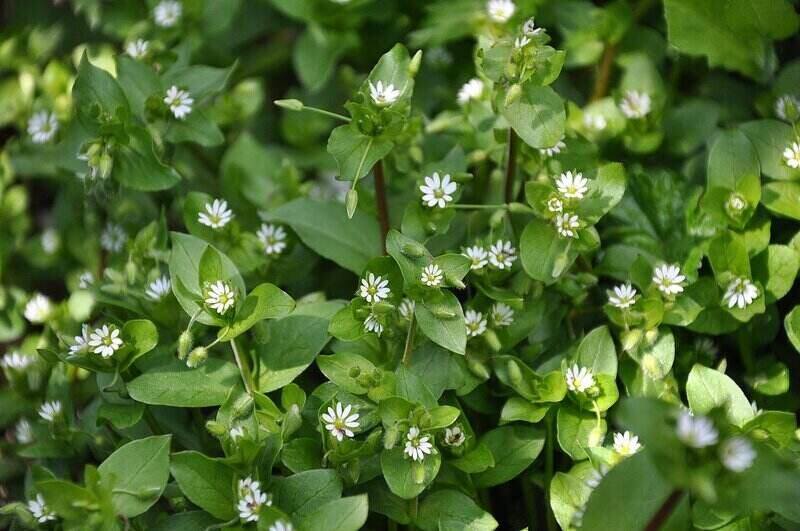
The arrival of spring brings warmer temperatures and new growth. It will be an important period for your Omaha lawn, as it will be waking up from its winter dormancy. Soon, it will be time to bust out the lawn mower and the fertilizer. What should homeowners do to have beautiful lawns this spring? Here are a few spring lawn care tips for Omaha lawns:
Before working on your lawn, make sure that the soil and your turf are completely dry. If you’re not careful, your lawn can get damaged. Wait until the snow has thawed out completely to really get started on tuning up your lawn.
Clean Up Your Lawn
It’s time to get out the rake and get the trash out of your lawn. Your grass can’t grow properly if it’s being blocked off from the sun by leaves, branches, thatch, forgotten toys, and other debris. Clearing your lawn will also show you any bare patches that you’ll need to overseed.
Aerate Your Lawn

If you missed lawn aeration in the fall, spring is the time to do it. Aeration loosens up the soil so that water, nutrients, and air get to your turf’s root system much easier. You should aerate your lawn if the soil is hard and compacted, which is quite common in the heavy clay soils that you find in eastern Nebraska.
It’s best to wait until your turfgrass is actively growing before aerating. That way, if your grass gets damaged during aeration, it can quickly recover.
Prepare Your Lawn Tools
Before you mow your lawn, make sure that your mower is in good condition. The most crucial parts are the mower blades. Instead of giving your turf a clean cut, dull blades will damage your turf. So, make sure to sharpen your mower blades before mowing your lawn for the first time this spring.
You should also check if everything else is in working order, repairing or replacing the parts that aren’t in good shape.
If you have other tools, like leaf blowers, weed eaters, and power rakes, check if they’re working, too. Add fresh fuel or charge the batteries for all of your tools.
Dethatch

What is thatch? Thatch is the layer of dead and living plant matter above the soil but below your turf. A thick layer of thatch can really hamper your lawn’s growth; it can invite diseases and pests, restrict the flow of water and nutrients, and restrict your turf’s root system.
To keep your lawn growing unrestricted, make sure to dethatch at least once a year. Raking helps clear thatch, but that won’t do much for very thick layers of thatch. You might need to use a special dethatcher or call a lawn professional to clear your lawn’s thatch for you.
Mow Wisely
Once your grass wakes up from dormancy, you should prepare to mow your lawn again. Make sure to mow to the proper height, not too long nor too short. Grass cut to the proper height not only improves its health but also shades out weeds like crabgrass. The ideal mowing height depends on what type of grass your Omaha lawn has.
Adjust Your Irrigation

In the spring, the University of Nebraska–Lincoln (UNL) suggests watering less often but much deeper. This means that you should let your sprinklers run for longer to get more water into the soil.
Your turf’s root system is much longer in spring compared to the winter and the summer, so you should give it more water. Here are some Omaha turfgrasses and their estimated water requirements in the spring:
- Kentucky bluegrass: 0.75 inches per week
- Tall fescue: 0.375 to 0.525 inches per week
Test Your Soil
Fertilizers are good for lawn health, but too much of a key nutrient – like nitrogen – can be harmful. It’s a good idea to test your soil before lawn fertilization so that you know exactly what to add. Soil testing will show you its pH level too, which is useful to know, as turfgrasses can only survive in certain pH ranges.
Fertilize Appropriately
Don’t fertilize too early! Fertilizing your lawn before it has woken up from dormancy just wastes the fertilizer; the plants can’t make use of it yet. The fertilizer will leach into the soil and into bodies of water, harming them. If the grass does grow, the new growth will get damaged by the cold.
Use a slow-release fertilizer sometime between April 15 to 25 if a soil test reveals that your cool-season lawn needs the nutrients. If it doesn’t, you can skip this application. One of the most important fertilizer applications comes at the end of spring, from May 25th to June 5th. Don’t miss that one. Warm-season grass – like buffalograss – should be fertilized in late spring, from May 5th to May 15th.
Overseed If Needed

Does your lawn have bare spots or browning patches? While it’s best to overseed many cool-season grasses in the fall, spring is also a good time to overseed your lawn. The UNL even recommends overseeding tall fescue in the spring – around April 15th at the earliest and May 10th at the latest. You can also overseed a Kentucky bluegrass lawn around that time, too.
For those with warm-season grass lawns, aim to seed or plug on May 20th at the earliest and get it done before June 20th.
Look for Signs of Lawn Disease
Nebraska lawns deal with three lawn diseases in the spring: dollar spot, fairy ring, and summer patch. Necrotic ring spot might also attack your Kentucky bluegrass in May. This is because fungi love wet conditions, which spring often brings. Your lawn might be diseased if it shows any of these signs:
- Circular patches of brown or tan turf
- Brown, black, or wilted roots
- Rings of dead grass, sometimes accompanied by a circle of mushrooms
These lawn diseases can usually be prevented with good lawn management, like proper fertilization and irrigation. In the event that you get these lawn diseases, you may need to bring out the fungicide or hire a professional to take care of it.
Watch For Weeds

Your turf isn’t the only thing that starts growing again in the spring; weeds do, too! Some notorious ones are crabgrass and foxtail. You want to get ahead of these pesky weeds by applying pre-emergent herbicide mid-spring. UNL suggests treating your lawn with these herbicides between April 15th and May 1st, before the weeds have germinated.
Siduron – more commonly known as Tupersan – is a pre-emergent herbicide that doesn’t kill newly seeded grass. Use that if you plan to overseed your Omaha lawn this spring.
If you spot any weeds, you should hand-pull them if possible. Hand-pulling is non-invasive and safe for your turf. If it’s a weed with tubers, make sure to really dig in with a garden tool to get the whole plant out.
FAQs About Spring Lawn Care in Omaha
To find out how long to run your sprinkler, get a few straight-sided cans, like tuna cans or cat food cans. Lay them around your sprinkler heads and let them run. Set a timer and wait until the water collected by the sprinkler reaches the measurement you need.
For example, if you need to water a Kentucky bluegrass lawn, wait until the cans hold 0.75 inches of water. The time it took to fill the cans up is the time you need to run your sprinklers this spring.
Yes, there are home soil test kits available. However, you should send it off to a lab if you want a more detailed result. See UNL’s resource on local soil testing labs.
Don’t throw out the grass clippings! If spread throughout your yard, lawn clippings are actually a natural slow-release fertilizer. You can also use them as mulch elsewhere in your landscape. Make sure the clippings are dry before use.
Help Your Omaha Lawn Spring Back to Life
If you follow these spring lawn maintenance tips, you’ll be sure to have a healthy lawn this season. But spring is the time for new possibilities, so maybe you can take a break from lawn care to do something new. Why not take up bird watching? Spring is the peak season for nature activities like this in Omaha.
What about your beautiful lawn, you ask? Well, you can leave the lawn care to a professional. LawnStarter can connect you with a local pro that can help maintain your lawn. Contact an Omaha lawn care service today!
Main Image Credit: Ryan Renner / Flickr / CC BY 2.0